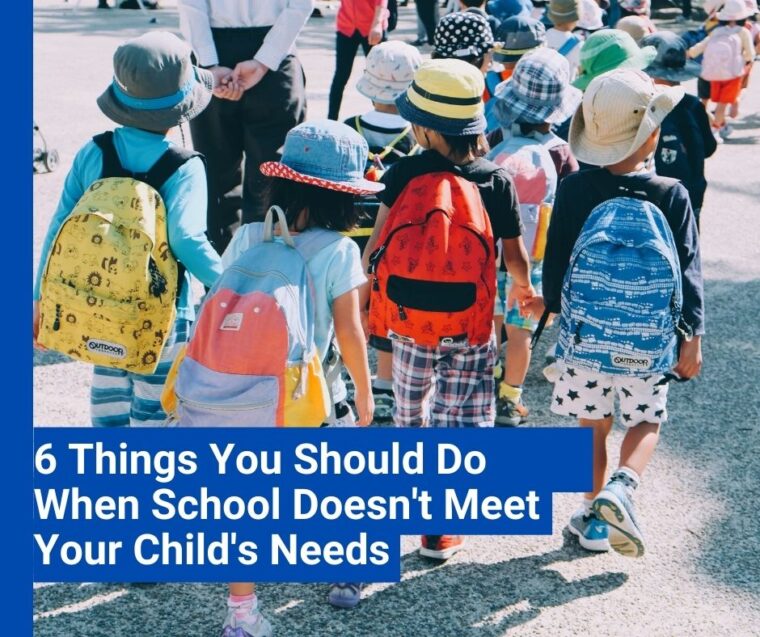6 Things You Should Do When School Doesn’t Meet Your Child’s Needs

One common concern among all parents is whether their child’s needs are being met in school. There are all kinds of areas where there could be problems involving a lack of physical, social, emotional, and cognitive support. Our kids are number one in our books, but we worry they are not given their due in the classroom. This is normal, but that normally can be a double-edged sword. The school’s faculty is aware of this truth and may be prejudiced against hearing out concerned parents with legitimate complaints. And legitimate they are! In many cases, gifted young minds are being forced to submit to lesson plans and assignments below their abilities.
If you feel your child’s needs aren’t met in school you have a right to be heard. More importantly, they have a right to exercise their gifts and aspire to reach their full potential. When your kids show signs of frustration and you have these concerns, here are six things that should help.
Get a Full Perspective
Step one: reality check. Since we have self-awareness, we can see how our child’s teachers may potentially view us as overbearing and overprotective, or even delusional. Because of that bias, we have to do everything we can to approach the situation rationally. We can’t take everything our kids tell us at face value (I know I can’t). We also have to understand that every story has two sides and hearing the other’s perspective is crucial if you are going to approach an effective resolution.
Demonstrate Commitment (And Ask For the Same)
The other thing that needs to happen before taking any other action regarding your child’s teacher is to acknowledge what you can personally do to improve the situation. Ask how you can help? Make a commitment to aiding the school in dealing with concerns that they have, such as behavior, attentiveness, turning in assignments on time, etc. Make the commitment and follow-through, but make sure you make your requests to the teacher clear and doable so you can track their progress.
Be Personable and Avoid Escalation
Another important thing to do, no matter how fired up you are about holding the school accountable, is to stay calm and diplomatic. In-person this is easier to do, but when communicating in written form you might have to work harder to treat the recipient as you would face to face. Be direct, but don’t act hostile. The “what can I do to help you…” approach is usually the safest. Try not to make threats, but make an appointment with a third party such as the school’s vice-principal to reach a constructive resolution.
Create a Binder (Just in Case)
Resolving issues through the school, even when they agree there is an issue, can take time and a lot of red tape. It’s important to set clear expectations for what will happen and when. You don’t want it open-ended for months while nothing changes. On your end, keep records and lots of them. anything that will illustrate your point or support your argument for your child’s development. The more you have to point to if matters come to a head, the better chance you have at being heard.
Start a Contingency Plan
Before things go too far or get out of hand, it’s never too early to consider alternatives. We like to think of school as a springboard for children to gain confidence, grow and aspire to the heights that we know they are capable of. Sadly, this is not the reality. If your child doesn’t fit in, it is more likely you will have to remove them than it is that the school will change their daily operations to suit them. It’s equally unlikely that the situation will be different at another school. However, you may be able to find one with programs geared to your child in your area.
Consider everything at your disposal from homeschool to private tutors. Try to find ways that they can get what they need outside of school. At the same time, keep from being bored while they are in school. Run your ideas by the teachers so they are okay with solutions such as bringing puzzles to class, quiet reading, etc. If one class, in particular, poses an issue, the principal may be open to swapping it out with another class or private tutoring.
Give Your Child Your Perspective (with a Positive Spin)
Throughout all of it– no matter your battles– it’s important to remain positive. As I mentioned before, our kids are sponges and they will respond to your negativity. It will impact their attitudes and inevitably make matters worse. They’ll overreact! You’ll take their side, and the school becomes demonized just for doing what they are actually there to do. This upsets any chance for a solution in working with the school. It also lays a poor foundation for equipping kids to deal with setbacks productively. Always be transparent about what’s going on but make sure they see it through as objective a lens as possible. That will ease some tension and help them develop important skills in the long run.
